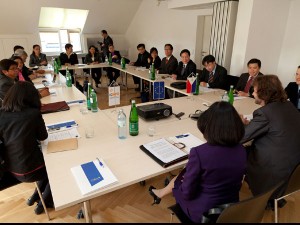EU helps boost Philippines’ capacity to combat human trafficking

“This training on the practical implementation of the EU policies in the area of migration and trafficking in human beings is yet another sign of the joint commitment of closer cooperation between the EU and the Philippines in the area of migration,” EU Head of Delegation, Ambassador Guy Ledoux said in a statement.
The workshop was funded by the EU and was held from May 15 to 17. It was attended by 15 Philippine labor and welfare attachés posted in Philippine Embassies in EU Member States.
“The training will equip the Philippine Embassy staff (posted in Austria, Spain, Italy, Greece/Cyprus, UK, Switzerland and Belgium) with increased capacities for the practical implementation of EU rules on immigration, which is in the joint interest of Filipino migrants and receiving EU countries alike,” the statement said.
Philippine Overseas Employment Agency (POEA) Director Melchor Dizon participated in the workshop and thanked the EU for hosting the workshop.
“We are grateful to the EU for extending this training, which we think is an excellent opportunity to further enhance our cooperation in the migration field. Since the training is focused on the concrete application of the existing EU rules, it will increase the capacity of our embassy staff in their daily work of assisting Filipino citizens living in, or intending to migrate to Europe,” Dizon said in the statement.
Article continues after this advertisementA recently launched “EU immigration portal” was also introduced to the participants as a “first point of entry for up-to-date, practical and understandable information on migration issues in each of the 27 individual EU Member States.”
Article continues after this advertisementThe new online portal “is addressed to third-country nationals who consider migrating to the EU, or who already are in the EU, as well as to migration authorities and organisations outside the Union,” it said.
Ambassador Guy Ledoux said “the Portal is a very useful website for Philippine migration authorities and migrants alike, to help them better understand the rules that have to be complied with to enter the Union. General information about the EU and its Member States as well as the risks of irregular migration will be offered, and it provides specific practical information about procedures in all 27 EU States for each category of migrants.”
The statement cited statistics from Philippine government which showed that “out of the estimated nine million Filipinos abroad, more than 600,000 were residing or working in Europe in 2011. For the same year, remittances from these Europe-based migrants amounted to $2.8 billion.”
“Building dialogue and partnerships with countries of origin and transit, based on solidarity and shared responsibility, is also an essential aspect of the common EU approach to migration. This migration training workshop for Philippine government officials in Europe is a concrete example of such dialogue,” the statement said.